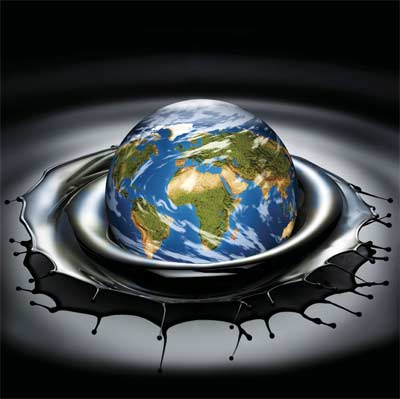Democrat -September 2006 (Number 97)
The lubricant that creates friction

Oil, gas, water and the EU are large factors in the current turmoil in the Middle East. Old imperial connections and ambitions persist and the rivalry for influence between the US and the EU, and within the EU itself, is just below the surface.
Proposed and existing oil, gas and water pipelines cross land and sea. Their routes attempt to circumnavigate current or potential trouble spots. New discoveries of gas and oil fields heighten the tension and raise the stakes to satisfy the avaricious "west" and developing countries for these forms of energy. In turn this is wrecking the planet's environment. There is no regard for leaving any of these fields for the use of future generations. The wealth created is not being used to alleviate the dire poverty some people suffer in this region or in Africa where there are newly discovered fields and raw materials.
Solomon
It would require a whole panel of Solomons sitting a long time to sort the pros and cons of the various disputes in this region and the Democrat has no wish to lecture anybody. It is clear these disputes are used as a cover by vested interests.
Whilst the bombing of Lebanon was taking place the police and security services in Britain have been arresting tens of people on suspicion of being terrorists. This is reminiscent of the fishing exercises carried out against the Irish community in Britain where innocent people's lives were wrecked. The saying at the time was "innocent until proved Irish".
There are factors which emanate from the EU which is a temporary alliance of European imperialists. They have all suffered broken empires but the imperialism remains. Imperialism is the exploitation of one country by another and this includes removing raw materials and other resources to make huge profits. As one African leader said "The Europeans are back again to take away our raw materials".
Policy of destruction
Military action in recent times consists of artillery shelling and bombing from a height to destroy the infrastructure of a country before occupation or submission and to intimidate. Armed forces from the EU alongside the USA took part in the destruction and break up of Yugoslavia. Britain with the USA took part in returning Iraq to biblical times. Israel with the material and political backing of the USA has copied the wholesale destruction in Lebanon.
The EU is now involved in the reconstruction of Lebanon's infrastructure in which there will be large profits.
The EU will also be providing armed forces in South Lebanon from six Member States. Germany has pencilled in using task forces to blockade Lebanon and patrol roads in Lebanon which has been welcomed by Israel. Israel would like to reject the use of troops from Muslim countries with which it has no diplomatic relationships.
Imperialism persists
Working against this call for further integration is the rivalry on the ground in the eastern Mediterranean. German enterprises have carried out a major expansion in this area in direct competition with French companies. Syria and the Labanon were former French colonies. Before the First World War, Germany had many interests and colonies in the Middle East and Africa and had them taken away by the victors who were themselves imperialists.
During the Second World War Germany attempted to expand and was desperate to get to the oil fields to fuel the Nazi war machine and take over the strategic Suez Canal. Since that war Germany has developed a special relationship with Israel.
In the post war period Britain controlled what was then Persia and is now Iran where BP ruled until the Shah was toppled. It does not take much savvy to work out that the old imperialists want to keep the Middle East unstable and have a large measure of control to facilitate taking out the oil and gas.
Following the occupation of Iraq the latest nation states to come into the cross wires are Iran and Syria. To the north of Iran is the Caspian Sea where large oil and gas fields are being tapped. Pipelines exist or are proposed to supply China and terminals in the Mediterranean, Black Sea, Red Sea and Persian Gulf.
Key BP pipeline
The inauguration of the pipeline from Baku on the Caspian Sea via Tblisi in Georgia to Ceyhan in Turkey just north of the Syrian border took place the day before bombing of Lebanon started. The major stakeholder in the BTC pipeline is BP. Those attending this event were senior government officials from the USA, Britain and Israel, BP head Lord Browne with representatives from Chevron, Conoco-Philips, France's Total and Italy's ENI.
Several authorities have suggested the real plan is to have a military controlled land corridor against the Mediterranean running across Lebanon and Syria into Turkey. This would be an alternative plan to placing four pipelines under the Mediterranean from Turkey to Israel. Oil and gas could then be taken across Israel to the Red Sea terminal at Eilat and onto the Fare East. Turkey and Israel are working towards extracting water from the Tigris and Euphrates upstream from Iraq and Syria and piping this to Israel.
Different perspective
All this puts the military action against Lebanon in a different light and would explain why the USA and Britain did not press for a ceasefire in South Lebanon. The Israeli Prime Minister has said their will be a "long war" and US Secretary Condoleezza Rice visiting the region before the ceasefire stated her objective was to isolate Syria and Iran. This in itself confirms there were well laid plans.
This overview gives an idea of the forces and interests involved in the Middle East and surrounding regions where oil, arms and war reign instead of peace and the alleviation of poverty.